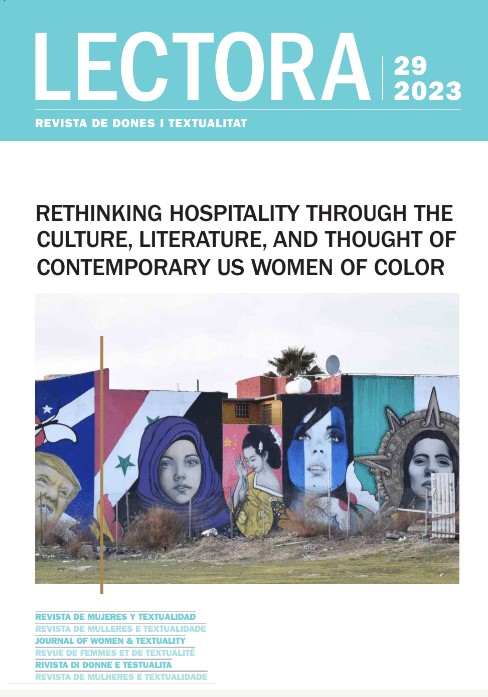Of Strangers and Relations: Native American Hospitality in Toni Jensen and Susan Power
DOI:
https://doi.org/10.1344/Lectora2023.29.2Keywords:
Native American hospitality, relationality, solidarity, decolonial love, hopeAbstract
This article examines narrative articulations of Native American hospitality in the autobiographical essay “The Worry Lines” (2020), by Métis writer Toni Jensen, and the fictional chapter “Sacred Wilderness” (2014), by Standing Rock Sioux Tribe member Susan Power. In both texts, relevant connections to the Other are made outdoors by means of words, deriving in the lowering of walls—which both separate and connect—and calling for a reexamination of Indigenous peoples as strangers within the doors of the US settler colonial state. The result is a vindication of Indigenous sovereignty and literary activism through the epistemological and ethical value of relationality, as well as a contribution to hospitality studies more broadly through its vindication of the power of conversation and literature.
References
Anthias, Floya (2018), “Identity and Belonging: Conceptualizations and Reframings through a Translocational Lens”, Contested Belonging: Spaces, Practices, Biographies, K. Davis, H. Ghorashi and P. Smets (eds.), Bingley, Emerald Publishing: 137-59.
Balibar, Étienne (2017), “Reinventing the Stranger: Walls all over the World, and How to Tear them Down”, Symplokē, 25, 1-2: 25-41.
Bauman, Zygmunt (2016), Strangers at Our Door, Cambridge, Polity.
Coulthard, Glen (2014), Red Skins, White Masks: Rejecting the Colonial Politics of Recognition, Minneapolis, U of Minnesota P. “Day of 8 Billion” (2022), United Nations, 10/12/2022.
Derrida, Jacques (2010), “Hostipitality”, Acts of Religion, Gil Anidjar (ed. and trans.), London and New York, Routledge: 358-420.
Gross, Lawrence (2014), Anishinaabe Ways of Knowing and Being, London and New York, Routledge.
Jensen, Toni (2020), Carry: A Memoir of Survival on Stolen Land, New York, Random House.
Kelsey, Penelope (2015), “Sacred Wilderness (Review)”, Journal of the Native American and Indigenous Studies Association, 2, 2: 199-201.
LaDuke, Winona (1999), All Our Relations: Native Struggles for Land and Life, Chicago, Haymarket.
Manzanas Calvo, Ana Mª and Jesús Benito Sánchez (2017), Hospitality in American Literature and Culture: Spaces, Bodies, Borders, London and New York, Routledge.
Martín-Lucas, Belén (2022), “Decolonial Love as Critical Pedagogy: Learning Response-ability from Indigenous Authors”, Plenary Lecture, 45th AEDEAN Conference.
Martínez-Falquina, Silvia (2023), “Grounded Relationality: Anishinaabe Literature, Ceremony and Activism”. Indigenous Journeys, Transatlantic Perspectives: Relational Worlds in Contemporary Native American Literature, Anna Brígido-Corachán (ed.), East Lansing: Michigan State UP. Power, Susan (2014), Sacred Wilderness. East Lansing: Michigan State UP.
Simmel, Georg (1994), “Bridge and Door”, Theory, Culture & Society, 11: 5-10. Simpson, Leanne (2017), As We Have Always Done: Indigenous Freedom through Radical Resistance, Minneapolis: U of Minnesota P.
Solnit, Rebecca (2016), Hope in the Dark: Untold Histories, Wild Possibilities, Chicago, Haymarket Books.
Ureña, Carolyn (2014), “Loving from Below: Of (De)colonial Love and Other Demons”, Hypatia, 32, 1: 86-102.
Downloads
Published
How to Cite
Issue
Section
License
Copyright (c) 2023 Silvia Martínez-Falquina

This work is licensed under a Creative Commons Attribution-NonCommercial-NoDerivatives 4.0 International License.
The Author retains ownership of the copyright in this article and grants Lectora: revista de dones i textualitat the rights to print publication of the Article. The work will be available under a Creative Commons Attribution-Noncommercial-No Derivative Works license, by which the article must be credited to the Author and the Journal be credited as first place of publication.
The Author is free to enter in seperate, additional contractual agreements for the non-exclusive distribution of the work as published in this journal (such as institutional repositories or a book), as long as the original publication in Lectora is credited.
The Author is encouraged to post the work online (eg in institutional or thematic repositories, or in their website), as it can lead to productive exchanges as well as to a greater citation of the published work (see The Effect of Open Access).





